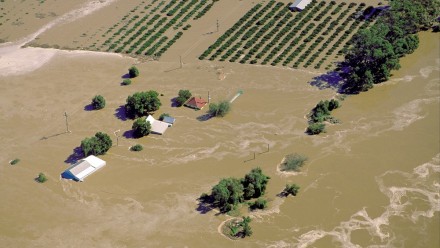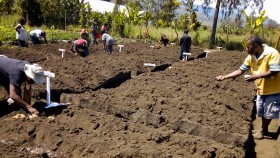ANU partners with regional communities on flood solutions
Recent severe flooding in NSW and Queensland has left local communities decimated. Now, in a new national initiative, ANU researchers will work with regional communities, governments, industry and the private sector on a project to co-design solutions which reduce damage from flooding.
The project brings together a team of ANU researchers across water science, ecology, economics, social science, engineering, policy, mathematics and modelling. The researchers will partner with rural, regional and peri-urban communities in New South Wales, Queensland and Victoria to assess and quantify options for increasing community resilience to coastal and inland river flooding.
A central focus of the flood resilience project will be developing the first ever Australian guidelines for integrating a natural assets-based approach to mitigation of flooding by rivers. The guidelines will provide communities with new data and information, building capability for proactive flood mitigation, with an emphasis on multi-benefit and multi-hazard approaches.
“The guidelines will be integrated with existing national, state and local government flood management guides, enhancing them to account for the additional risks posed by a changing climate,” said Dr Roslyn Prinsley, Head of Disaster Solutions at the ANU Institute for Climate, Energy & Disaster Solutions (ICEDS) and Chief Investigator on the project.
According to Dr Prinsley, disaster preparedness is now a key issue for local communities, particularly given the increasing impacts of climate change.
“We need to rethink the way we plan and prepare for flooding. Sea-level rise, the nature and frequency of storms, and other climate-affected drivers are exposing vulnerabilities in flood risk management strategies that have been implemented over the past century. With an increased frequency and severity of extreme weather events due to climate change, we need to learn from these experiences and prepare better for floods,” she said.
Another output of the project will be a tool aimed to empower local governments with the necessary capacity and capability to decide which flood mitigation solutions are suitable in their situation.
“In selecting options for flood mitigation, local decision-makers need high confidence in flood modelling and the capacity to undertake it where required, as well as adequate access to data,” said Dr Prinsley. “ANU will work with communities to investigate options for achieving this.”
Funded under by the National Recovery and Resilience Agency through the Federal Disaster Risk Reduction Package, the project will be guided by a multi-stakeholder Advisory Committee, comprising members of impacted jurisdictions, industry sectors, professional associations and world experts.
“The Advisory Committee will ensure that we learn from incorporating the best of all sectors’ knowledge and experience into our framework, and also aid implementation of our findings in relevant, practical ways,” said Dr Prinsley.
Work on the project will commence in June.











